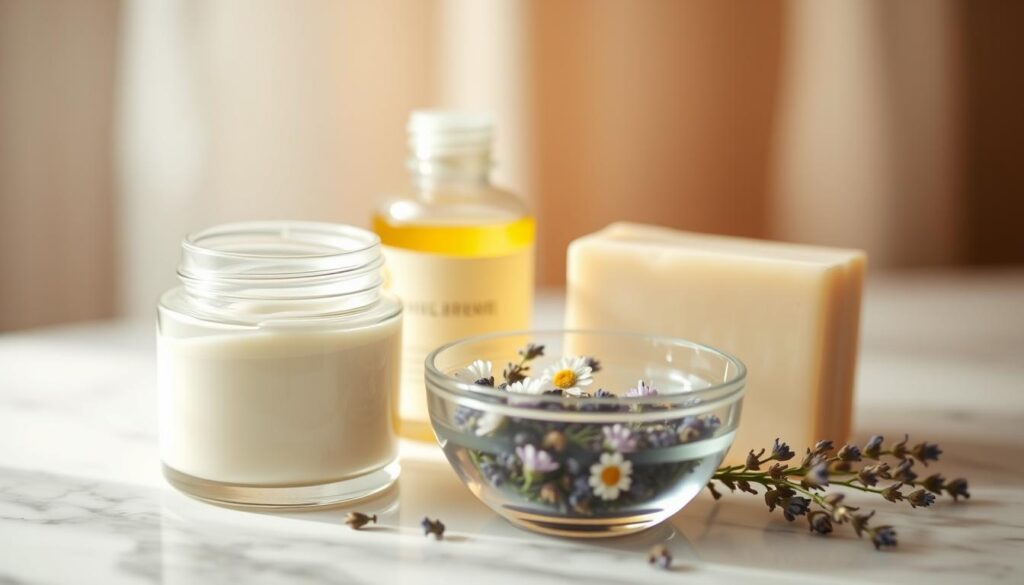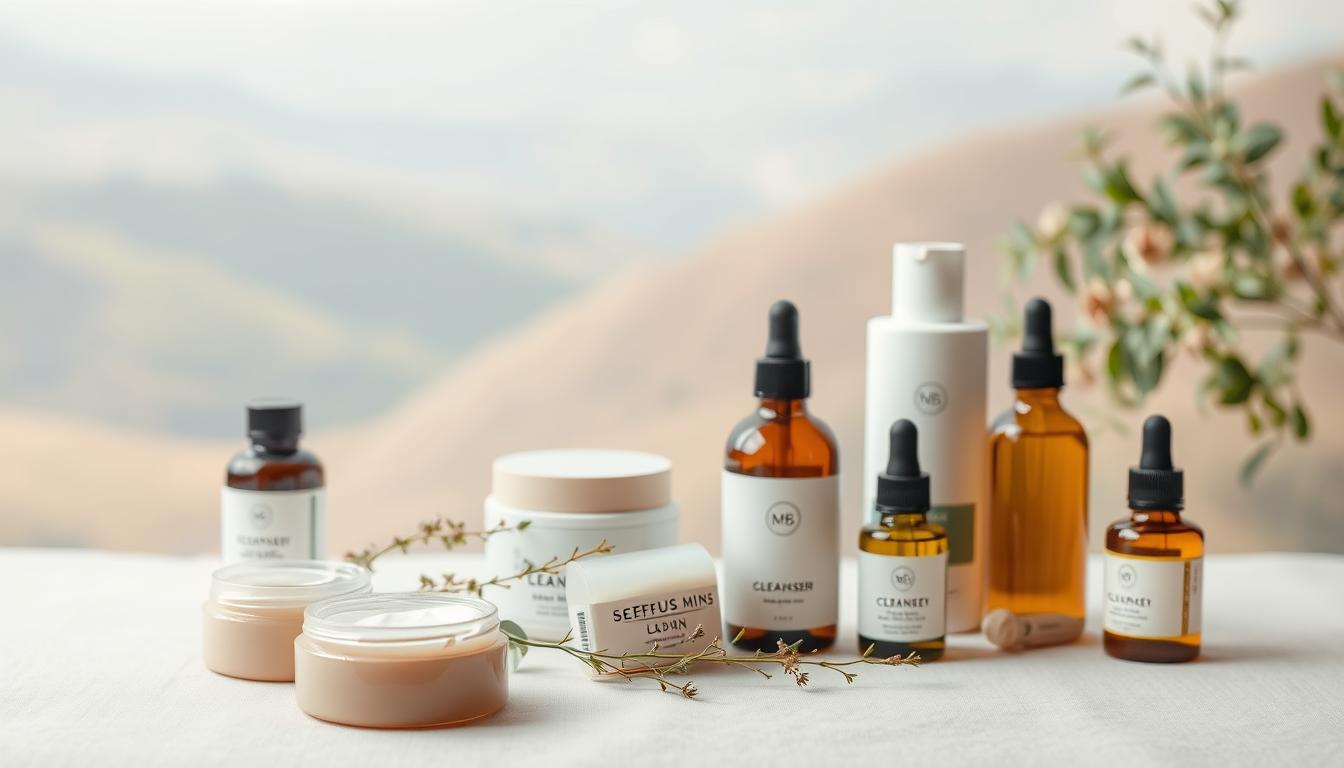Did you know that irritated skin affects millions of Australians? It causes discomfort and distress every day. Inflamed skin is a big challenge, but soothing relief is within reach.
Making simple changes to your skincare routine and lifestyle can help a lot. Using natural products and staying hydrated are good ways to calm irritated skin.
By using gentle skincare practices, you can reduce inflammation. This leads to healthier, more radiant skin. It’s time to take control of your skin health.
Key Takeaways
- Stay hydrated to reduce skin inflammation
- Use natural products to soothe irritated skin
- Make gentle skincare practices a part of your daily routine
- Avoid harsh products that can exacerbate skin irritation
- Consider lifestyle changes to support skin health
Understanding Inflamed Skin: Causes and Symptoms
Dealing with inflamed skin can be tough. But knowing what causes it helps you manage it better. Inflamed skin shows as redness, irritation, and sometimes pain. It’s important to understand the causes and symptoms to find the right treatment.
Common Triggers of Skin Inflammation
Many things can cause skin inflammation. These include environmental factors like pollution and UV rays, hormonal changes, certain products, allergies, and skin conditions. Knowing these triggers helps you prevent it.
Recognizing the Signs of Inflamed Skin
Inflamed skin shows signs like redness, swelling, warmth, and sometimes pain or itchiness. Spotting these signs early helps you soothe your skin quickly. If symptoms last or get worse, see a dermatologist for help.
Importance of a Gentle Skincare Routine
Having a gentle skincare routine is key for calming inflamed skin. It helps restore the skin’s natural balance. Using simple products that are gentle can soothe irritated skin.
When your skin is inflamed, it needs gentle care. Harsh products can make things worse. But, a gentle approach can help reduce inflammation and aid in healing.
Choosing the Right Cleanser
Choosing the right cleanser is the first step in a gentle skincare routine. Look for one that is fragrance-free and made for sensitive skin. Gentle cleansers without harsh ingredients help keep the skin’s natural barrier intact without causing irritation.
Benefits of Hydrating Toners
Using a hydrating toner after cleansing is very beneficial. Hydrating toners balance the skin’s pH and add moisture. They also help the skin absorb other products better, making them more effective.
When picking a toner, choose one that’s alcohol-free and has soothing ingredients. This can calm the skin and lessen redness.
Top Soothing Ingredients for Inflamed Skin
Using the right ingredients is key to soothing inflamed skin. They help calm redness and discomfort. Knowing what to look for in products or natural remedies is important.
Aloe Vera: Nature’s Calming Agent
Aloe vera is famous for its anti-inflammatory properties. It’s great for soothing inflamed skin. Aloe vera gel can be applied directly to calm irritation and hydrate the skin.
Chamomile: Reducing Redness and Irritation
Chamomile is a natural ingredient that calms inflamed skin well. It has anti-inflammatory and antioxidant properties. Using products with chamomile extract is good for sensitive skin.
Colloidal Oatmeal: Moisturizing and Protecting
Colloidal oatmeal is gentle on irritated skin. It moisturizes, reduces inflammation, and protects from further irritation. A colloidal oatmeal bath can offer great relief for inflamed skin.
Adding these ingredients to your skincare routine can help a lot. Knowing their benefits helps you choose the best products and treatments for your skin.
The Role of Moisturizers in Soothing Skin
Moisturizers are key in calming and hydrating inflamed skin. They help hydrate and reduce inflammation. This makes them a must-have in any skincare routine for soothing irritated skin.
When picking a moisturizer for inflamed skin, choose gentle, non-irritating ones. Non-comedogenic moisturizers are great because they don’t clog pores. This reduces the chance of more irritation.
Non-Comedogenic Options for Sensitive Skin
For those with sensitive skin, non-comedogenic moisturizers are a big help. They hydrate without causing breakouts or making skin inflammation worse. Look for ‘non-comedogenic’ or ‘oil-free’ labels to avoid irritation.
Ingredients like hyaluronic acid, ceramides, and niacinamide are good in these moisturizers. They keep moisture, repair the skin, and lower inflammation.
| Ingredient | Benefit |
|---|---|
| Hyaluronic Acid | Retains moisture, soothes dry skin |
| Ceramides | Repairs the skin barrier, enhances hydration |
| Niacinamide | Reduces inflammation, improves skin elasticity |
When to Apply Moisturizers for Best Results
Applying moisturizer at the right time is important. Apply it immediately after cleansing when your skin is damp. This seals in moisture and supports the skin’s barrier.
Also, reapply moisturizer during the day, after washing your hands or face, or if your skin feels dry or tight. Being consistent helps keep your skin hydrated and calm.

DIY Remedies to Soothe Inflamed Skin
Calming inflamed skin is easier than you think with the right DIY remedies. You can make them with common household ingredients. Inflamed skin can be tough to manage, but simple treatments can help reduce redness and irritation.
Calming Face Masks You Can Make at Home
Using a calming face mask is a great way to soothe inflamed skin. You can make your own face masks at home with natural ingredients like honey, avocado, and oatmeal. For example, a honey and yogurt mask can hydrate and calm irritated skin.
Just mix 1 tablespoon of honey with 1 tablespoon of plain yogurt. Apply it to your face for 15-20 minutes before rinsing off with warm water.
Another good option is an avocado and oatmeal mask. Mash ripe avocado and mix it with colloidal oatmeal to create a soothing paste. Apply this mask to your face and leave it on for 20 minutes before rinsing off. The healthy fats in avocado and the anti-inflammatory properties of oatmeal work together to calm and moisturize inflamed skin.
The Power of Cool Compresses
A cool compress is a simple yet effective way to reduce inflammation and soothe irritated skin. To make a cool compress, wet a clean cloth with cold water, wring it out so that it’s not dripping, and apply it to the affected area for a few minutes. You can repeat this process several times a day as needed.
For an added benefit, you can infuse the water with calming herbs like chamomile or green tea. Simply steep a tea bag in hot water, let it cool, and then use it to wet your compress cloth. The anti-inflammatory properties of these herbs can help to further reduce redness and irritation.
Avoiding Irritants in Your Skincare Products
The key to soothing inflamed skin is to know what’s in your skincare products. Avoiding irritants is key. By making smart choices, you can calm and protect your skin.
Ingredients to Steer Clear Of
Some skincare ingredients can irritate your skin, making it worse. Here are some common irritants:
- Fragrances: Synthetic fragrances can cause irritation and allergic reactions.
- Alcohol: Certain types of alcohol, like denatured alcohol, can strip the skin of its natural oils, leading to dryness and irritation.
- Exfoliating Acids: While beneficial in moderation, overusing exfoliating acids like glycolic acid or salicylic acid can irritate the skin.
- Parabens: Some individuals may be sensitive to parabens, which are used as preservatives in many skincare products.
Knowing these ingredients helps you pick products that are less likely to irritate your skin.
Reading Labels Effectively
To avoid irritants, it’s important to read labels well. Here are some tips:
- Start with the ingredient list: Ingredients are listed in order of concentration, so pay attention to the top ingredients.
- Look for certifications: Products with certifications like “hypoallergenic” or “fragrance-free” are less likely to contain irritants.
- Check for natural ingredients: Opt for products with natural soothing ingredients like aloe vera or chamomile.
By becoming a savvy label reader, you can reduce your exposure to skin irritants.
Remember, everyone’s skin is different. It may take some trial and error to find the right products. Be patient, and don’t hesitate to consult a dermatologist if you’re unsure about a product or ingredient.
Incorporating Anti-Inflammatory Foods into Your Diet
Eating a balanced diet with anti-inflammatory foods can change your life if you have inflamed skin. Making smart food choices can calm your skin and improve your overall health.
Foods That Promote Skin Health
Some foods can greatly improve your skin’s health. Fatty fish like salmon and sardines are full of omega-3s, which fight inflammation. Leafy greens such as spinach and kale are loaded with antioxidants that shield your skin.
Berries are full of vitamins and antioxidants, and walnuts have omega-3s and antioxidants too. Adding these to your meals can cut down inflammation and make your skin healthier.
Supplements That May Help
Some supplements can also boost your skin health. Omega-3 supplements are great for those who don’t eat enough fatty fish. Probiotics help keep your gut and skin in balance, which can lower inflammation.
But, always talk to a doctor before taking any supplements. They can help you choose the right ones for you.
Lifestyle Changes for Skin Healing
Your skin’s health is tied to your lifestyle, including managing stress and staying hydrated. Making a few simple changes can greatly improve your skin’s healing and reduce inflammation.
Stress Management Techniques
High stress can make skin inflammation worse. Activities that reduce stress can help. Meditation and yoga are known to lower stress, making your skin healthier.
Other ways to manage stress include:
- Deep breathing exercises
- Progressive muscle relaxation
- Regular exercise, like walking or jogging
The Importance of Hydration
Drinking enough water is key for healthy skin. Water removes toxins and keeps skin hydrated. Aim to drink eight glasses of water a day for better skin.
Here’s how hydration affects your skin:
| Hydration Level | Skin Condition | Healing Ability |
|---|---|---|
| Adequate | Healthy, supple | Enhanced |
| Inadequate | Dry, irritated | Impaired |
Eating hydrating foods like watermelon and cucumbers also helps your skin. 
Recommended Skincare Products for Inflamed Skin
Inflamed skin needs gentle, effective care. The right products are key to soothing and healing it. It’s important to pick items that are both effective and gentle.
Serums and Treatments to Consider
Serums and treatments are vital for managing inflamed skin. Ingredients like aloe vera, chamomile, and colloidal oatmeal are great. Serums with anti-inflammatory properties can reduce redness and irritation.
Look for serums with soothing ingredients to calm your skin. Choose products labeled for sensitive skin. These are made to be gentle and non-irritating. For more tips on products for redness and rosacea, check out this resource.
| Product Type | Key Ingredients | Benefits |
|---|---|---|
| Soothing Serum | Aloe Vera, Chamomile | Reduces inflammation, calms the skin |
| Colloidal Oatmeal Cream | Colloidal Oatmeal, Glycerin | Moisturizes, protects the skin barrier |
| Calming Treatment Mask | Green Tea, Cucumber Extract | Soothes, hydrates the skin |
Best Brands for Sensitive Skin
Many brands focus on sensitive and inflamed skin. La Roche-Posay, Avene, and Cetaphil are known for their gentle products. Look for non-comedogenic or hypoallergenic labels to avoid irritation.
Choosing the right skincare can soothe and heal inflamed skin. It reduces discomfort and improves skin health.
When to Seek Professional Help for Inflamed Skin
If your skin keeps getting inflamed, it’s important to know when to get help. Even with good skincare and lifestyle changes, some problems need a doctor’s touch.
Identifying the Right Time for Professional Intervention
Look out for signs like intense redness, itching, or burning that won’t go away. If your skin becomes more sensitive or you get rashes, it’s time to see a doctor.
Exploring Treatment Options
A dermatologist can give you advice and suggest treatments that fit your skin. They might recommend creams, pills, or light therapy. Brands like Cetaphil and La Roche-Posay are often suggested for sensitive skin.
Knowing when to get help for inflamed skin is key to managing it well. By spotting the signs and trying treatments, you can keep your skin healthy.
FAQ
What are the common triggers of skin inflammation?
Harsh skincare products, environmental stressors, and certain foods can cause it. Avoiding these can help calm your skin.
How can I choose the right cleanser for my inflamed skin?
Choose a gentle, non-comedogenic cleanser without harsh ingredients. Soothing ingredients like aloe vera or chamomile are good choices.
What are the benefits of using hydrating toners?
Hydrating toners balance your skin’s pH, reduce inflammation, and prepare it for more products. They add extra hydration too.
How do aloe vera, chamomile, and colloidal oatmeal help soothe inflamed skin?
Aloe vera reduces inflammation and soothes the skin. Chamomile calms redness and irritation. Colloidal oatmeal moisturizes and protects, helping to alleviate inflammation.
Why are moisturizers important for soothing skin?
Moisturizers lock in hydration, reduce inflammation, and protect from environmental stressors. Applying them at the right time maximizes benefits.
What are some DIY remedies for soothing inflamed skin?
Try making calming face masks with honey, avocado, or oatmeal. Cool compresses can also reduce inflammation and soothe the skin.
How can I avoid irritants in my skincare products?
Read labels carefully and avoid harsh ingredients like artificial fragrances, dyes, and exfoliants. Choose hypoallergenic or fragrance-free products.
Can diet affect skin inflammation?
Yes, eating anti-inflammatory foods like omega-rich fish, leafy greens, and berries can help. Certain supplements may also be beneficial.
How do lifestyle changes promote skin healing?
Stress management, like meditation and deep breathing, and staying hydrated can help heal your skin and reduce inflammation.
What skincare products are suitable for inflamed skin?
Look for serums and treatments with soothing ingredients. Choose brands for sensitive skin. Non-comedogenic and fragrance-free products are good options.
When should I consult a dermatologist for inflamed skin?
If your skin inflammation doesn’t get better or gets worse, or if symptoms are severe, see a dermatologist. They can offer professional advice and treatment.

